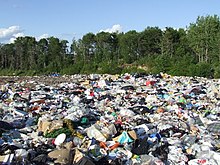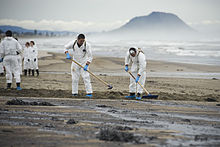Environmental law
During the "Great Stink" of 1858, the dumping of sewerage into the River Thames began to smell so ghastly in the summer heat that Parliament had to be evacuated.[13] If left untreated for long period of time, antibiotic resistance may occur and will eventually cause health problems as the treatment plants won't get filtered easily.Regulatory efforts include banning specific chemical constituents in consumer products (e.g., Bisphenol A in plastic bottles), and regulating pesticides.[22] Financial obligations are required for reaching quality standards to avoid risk of contamination that would raise public health concerns.[21] An economic approach is made to provide a budget for having running water regulated normally and varies among countries distribution systems in efforts to reach human standards.[22] Managing mineral resources can be challenging to maintain as supply chains have lower chances of traceability with importing goods from their designated spots for mining.[28] [29] Wildlife laws govern the potential impact of human activity on wild animals, whether directly on individuals or populations, or indirectly via habitat degradation.[34] Tackling illegal wildlife crime would require involvement and support from international policies and law enforcement such as INTERPOL and EUROPOL.Game laws can provide a legal structure to collect license fees and other money which is used to fund conservation efforts as well as to obtain harvest information used in wildlife management practice.Pope Francis in his 2015 encyclical letter Laudato si' acknowledged that "political realism may call for transitional measures and technologies, so long as these are accompanied by the gradual framing and acceptance of binding commitments".In 1992, the first UN Earth Summit resulted in the Rio Declaration, Principle 3 of which reads: "The right to development must be fulfilled so as to equitably meet developmental and environmental needs of present and future generations."[48] Identified as essential conditions for "accountable governments,... industrial concerns", and organizations generally, public participation and transparency are presented by UNEP as requiring "effective protection of the human right to hold and express opinions and to seek, receive and impart ideas,... a right of access to appropriate, comprehensible and timely information held by governments and industrial concerns on economic and social policies regarding the sustainable use of natural resources and the protection of the environment, without imposing undue financial burdens upon the applicants and with adequate protection of privacy and business confidentiality," and "effective judicial and administrative proceedings".[49] Public policies that are managed for sustainability would need financial incentives since the work put into these cases require lots of support and looking into ecological systems.[49] Debates with international relations still occur, focusing on the importance of participating in protecting natural resources by being involved with government policies.Where there are threats of serious or irreversible damage, lack of full scientific certainty shall not be used as a reason for postponing cost-effective measures to prevent environmental degradation.[50] The CJEU expressed the concern of “where there is uncertainty as to the existence or extent of human health, the institutions may take protective measures without having to wait until the reality and seriousness of those risks become fully apparent."[50] Budgets are proposed for recovering any damages to resources done to communities in relation to water, air, and soil that may be impacted as a result of natural causes such as floods, droughts, hurricanes, and wildfires.For instance, researchers Preston Teeter and Jorgen Sandberg highlight how smaller organizations can often incur disproportionately larger costs as a result of environmental regulations, which can ultimately create an additional barrier to entry for new firms, thus stifling competition and innovation.[67] Numerous legally binding international agreements encompass a wide variety of issue-areas, from terrestrial, marine and atmospheric pollution through to wildlife and biodiversity protection.If a country's legal system is completely divorced from its moral values, people may not abide by the laws and they will lose their significance and effectiveness."[71] The U.S. Environmental Protection Agency (EPA) is focused on the "growing urban and industrial pollution, water quality, electronic waste and indoor air from cookstoves."[72] In order to accomplish these goals in Africa, EPA programs are focused on strengthening the ability to enforce environmental laws as well as public compliance to them.These countries include Cambodia, China, Indonesia, India, Maldives, Japan, Korea, Malaysia, Nepal, Philippines, Pakistan, Singapore, Sri Lanka, Thailand, Vietnam, and Lao PDR.Topics for common EU legislation are: In February 2024, the European Parliament adopted a law making a big, intentionally caused, environmental damage “comparable to ecocide” a crime that can be punished by up to 10 years in prison.Chinese officials face critical challenges in effectively implementing the laws, clarifying the roles of their national and provincial governments, and strengthening the operation of their legal system.[95] The two Constitutions of 15 March 1992 and 20 January 2002 concretize this paradigm,[95] by stating a legal obligation of a clean environment,[95] by establishing a principle of compensation and a foundation of criminal nature.The rights approach is a break away from traditional environmental regulatory systems, which regard nature as property and legalize and manage degradation of the environment rather than prevent it.Ecuador's abusive past with the oil industry, most famously the class-action litigation against Chevron, and the failure of an extraction-based economy and neoliberal reforms to bring economic prosperity to the region has resulted in the election of a New Leftist regime, led by President Rafael Correa, and sparked a demand for new approaches to development."[107] The Ministry of Natural Resources and Environment of the Russian Federation makes regulation regarding "conservation of natural resources, including the subsoil, water bodies, forests located in designated conservation areas, fauna and their habitat, in the field of hunting, hydrometeorology and related areas, environmental monitoring and pollution control, including radiation monitoring and control, and functions of public environmental policy making and implementation and statutory regulation.[114] Vietnam is currently working with the U.S. Environmental Protection Agency on dioxin remediation and technical assistance in order to lower methane emissions.





Environmental Law (journal)Environmental impact assessmentAir quality lawWater quality lawWaste management lawEnvironmental cleanup lawSpecies protectionWater resources lawMining lawForestry lawFisheries lawGame lawEnvironmental journalsInternational environmental agreementsEnvironmental laws by countryEnvironmental lawsuitsEnvironmental ministriesSupranational environmental agenciesAdministrative lawBankruptcy lawClimate change litigationEarth jurisprudenceEarth lawEcocideEnergy lawEnvironmental crimepoachingEnvironmental personhoodEnvironmental justiceInsurance lawInternational lawLand lawLand useLaw of the seaProperty lawPublic trust doctrineRights of natureRight to a healthy environmentWar and environmental lawWild lawregulationsnatural resourcesforestsmineralsenvironmental impact assessmentseconomic developmentwildlife conservationinternational relationsList of years in the environmentcommon lawnuisancepigstiesstrict liabilitythreatsGreat StinkRiver ThamesMetropolitan Commission of Sewers Act 1848cesspitsParliamentLondon sewerage systemair pollutionGreat SmogClean Air Act 1956Air quality lawsair pollutantsatmospherethe quality of air inside buildingsozone layeremissions tradingacid rainclimate changeAir quality index (AQI)nitrogen dioxidecarbon monoxidesulfur dioxideWater quality lawswater qualitywater pollutantschemical, physical, radiological, and biological characteristics of water resourcespollutant concentrationssewage treatment and disposalindustrialagriculturalsurface runoffWaste management lawsmunicipal solid wastehazardous wastenuclear wastemany other typesgreen purchasingEnvironmental cleanup lawspollutioncontaminantssedimentsurface waterground watercadmiumsea cucumberschemicalsBisphenol ApesticidesToxic Substances Control Act (TSCA)Environmental Protection Agency (EPA)toxicityflammabilityenvironmental consequencesstrategic environmental assessmentenvironmental managementadministrative procedureWater lawwater resourceswater conservationminingForestry lawsforest landsforest managementtimber harvestingmultiple usesustained yieldforest inventoryconservationbiodiversityconservation statusesConservationistsINTERPOLEUROPOL